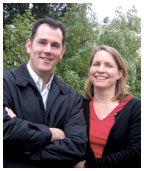|
Web Exclusives: Alumni Spotlight April 4, 2007:
PROFILE—John
Perry ’86 and Sarah Pelmas ’86 Princeton friends John Perry ’86 and Sarah Pelmas ’86 had debated repeatedly with their San Francisco buddies about the impact of the U.S. consumer lifestyle on the planet and on their own quality of life. In late 2005, they decided to do something about it: The 10 friends challenged each other to see if they could all go through the whole of 2006 without buying anything new. The group called themselves The Compact, after the Mayflower Compact, and pledged that for the entire year, they would purchase secondhand or borrow everything they needed, except for food and essentials like toiletries and medicine. “We thought that if we stopped participating in the cycle of disposable consumption and empty shopping, we could tread a little more lightly on the planet,” says Perry, a communications director at a high-tech company, who majored in English at Princeton. Sounds hard? They say it wasn’t. They shopped less overall and got creative when they needed specific items. They reserved “shopping” for times when there was something they really couldn’t do without. When Perry needed a pressure cooker to prepare vegetarian dishes for his partner and their two children, he found a used one on the Internet. Pelmas and her husband, who are renovating their home, found secondhand appliances and recycled wood for baseboards and cabinets. But they were stumped by how to find used nails, screws, and hinges, and broke down and bought them new instead — the only time they cheated. Pelmas also struggled with finding sports sunglasses for rowing. Never able to find a used pair, she taped up her old ones and kept using them instead. “It seems impossible and daunting, but it really isn’t,” says Pelmas, who studied English and creative writing at Princeton and now works as a school administrator. One of the benefits of ditching recreational shopping was more time for friends and family. “It’s completely changed the way we look at things,” Pelmas says. “Most things don’t seem necessary anymore.” The Compact unexpectedly morphed into a national — and international — phenomenon after the media in San Francisco caught wind of the project. Before the year was out, stories about it had run in dozens of U.S. and international media outlets. The Compactors started hearing from people around the country and around the world, including environmentalists and people concerned about global warming, but also from parents worried that their children were becoming too materialistic, and people troubled by the consequences of U.S. oil dependency. About 8,000 people have joined the e-mail list The Compact created to discuss the project, and groups modeled after The Compact have sprouted in 38 communities across the United States and in countries including Romania, New Zealand, and Japan. You can read more about The Compact on its blog at sfcompact.blogspot.com. The project was supposed to wind down at the end of 2006, but Perry
and Pelmas plan to continue living in the spirit of The Compact. “When
you stop engaging in ‘retail therapy,’ you realize how much you have
and how little you really need,” Perry said.
By E.B. Boyd ’89 E.B. Boyd ’89 is a freelance writer in San Francisco.
|
||

 John
Perry ’86 and Sarah Pelmas ’86 made a pact to borrow, or buy used,
anything they really needed for a year. (E.B. Boyd ’89)
John
Perry ’86 and Sarah Pelmas ’86 made a pact to borrow, or buy used,
anything they really needed for a year. (E.B. Boyd ’89)